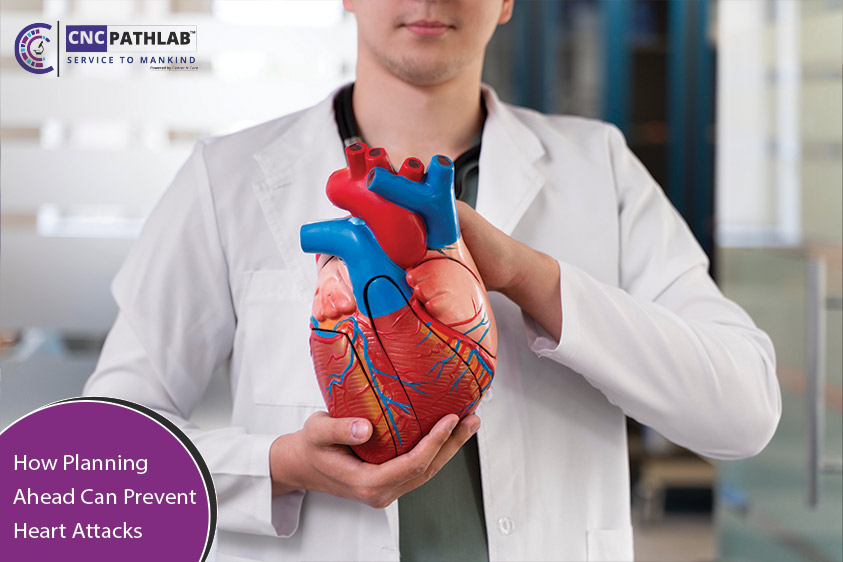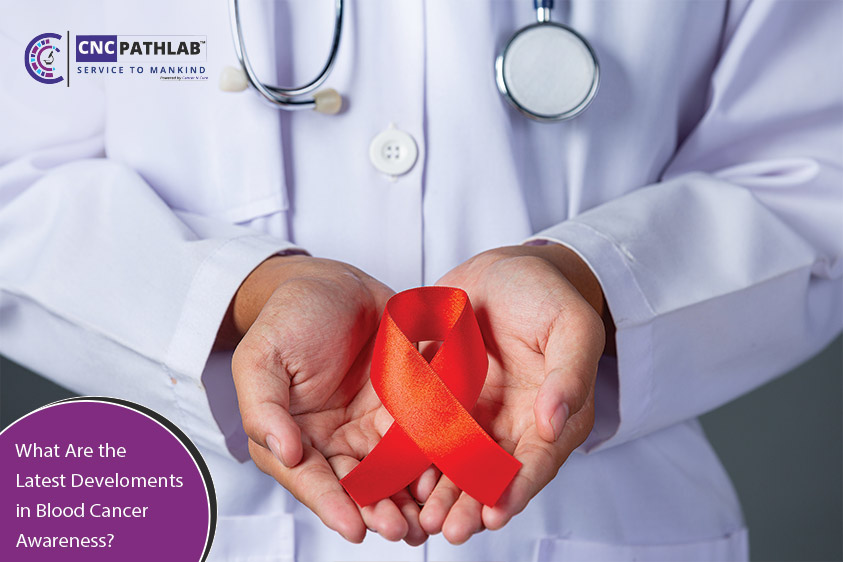The Power of Preparedness How Planning Ahead Can Prevent Heart Attacks
Heart attacks are a major concern for many patients seeking blood tests in Delhi. By understanding the causes and importance of early detection, you can plan ahead to prevent heart attacks from occurring. In this blog post, we'll explore how preparedness can be a powerful tool in keeping your heart healthy and avoiding potentially life-threatening events.
Understanding Heart Attacks and Their Causes
Heart attacks occur when blood flow to the heart is blocked or reduced, which can damage the heart muscle. There are several causes of heart attacks including high blood pressure, smoking, obesity and a family history of cardiovascular disease. It's important to take preventative measures such as eating a healthy diet and exercising regularly to reduce your risk.
Planning ahead and taking preventative measures such as regular check-ups with your doctor can play a crucial role in reducing the risk of heart attacks.
In addition to these lifestyle changes, planning ahead can also play an important role in preventing heart attacks. This includes scheduling regular check-ups with your doctor, staying hydrated and avoiding extreme weather conditions like blizzards that could put added stress on your body. By being proactive about your health and taking steps to prevent disastrous events before they happen, you can reduce your risk of experiencing a heart attack in the future.
What is a heart attack?
A heart attack occurs when blood flow to the heart is blocked, causing damage or death to a part of the heart muscle. This can result in serious health consequences and even death. Symptoms that may indicate you are having a heart attack include chest pain or discomfort, shortness of breath, nausea or vomiting, lightheadedness, and pain in other areas such as your arms, jaw or back.
According to recent statistics from the World Health Organization (WHO), nearly 18 million people worldwide die each year due to cardiovascular disease including heart attacks. Planning ahead with lifestyle changes such as maintaining a healthy diet and exercise routine along with regular check-ups with your doctor can help prevent this disaster from occurring.
Causes of heart attacks
Risk factors that increase your chances of experiencing a heart attack include high blood pressure, high cholesterol levels, smoking, obesity or being overweight, and diabetes. These factors can damage the blood vessels and the heart muscle over time and increase the likelihood of a cardiac event.
Lifestyle choices that can contribute to the development of cardiovascular disease include physical inactivity, consuming an unhealthy diet with excessive amounts of saturated fats and added sugars, and chronic stress. Additionally, dehydration can also play a role as it leads to thicker blood which makes it harder for the heart to pump.
Medical conditions or complications that may lead to a higher risk for cardiac events are coronary artery disease (CAD), arrhythmias such as atrial fibrillation (AFib), valvular heart disease (VHD), congenital heart defects present at birth or acquired later in life due to infection or other causes. In cases where there is a family history of sudden cardiac death at an early age (< 50 years old), inherited genetic mutations might be responsible for increasing susceptibility towards developing CAD.
The Importance of Early Detection
Early detection is crucial in preventing heart attacks. Getting regular check-ups and blood tests can help detect risk factors such as high cholesterol levels, high blood pressure, and diabetes. Making lifestyle changes early on to address these risk factors can prevent the development of heart disease.
There are various types of tests available for early detection of heart disease including lipid profile test, fasting blood sugar test. These tests provide valuable information about an individual's overall health status and can indicate potential issues before they become serious. It's important to talk to a healthcare professional about what tests are right for you based on your age, family history, and other risk factors.
Why early detection is crucial
Heart attacks - the silent killer. Often, there are no warning signs or symptoms of a heart attack until it's too late. That's why early detection is crucial in preventing and managing this deadly condition.
Ignoring risk factors can be dangerous. Factors such as high blood pressure, smoking, obesity, diabetes and family history all increase your risk for heart disease. By ignoring these risks and not seeking regular screening tests, you're putting yourself at greater danger of experiencing a heart attack.
Regular screenings may save your life. Checking your cholesterol test, blood pressure and other health markers on a routine basis can help detect potential problems before they become serious issues that require emergency care or hospitalization. Early detection gives you time to make lifestyle changes or start treatment to prevent further damage to your heart.
Types of tests for early detection
Detecting heart problems early is crucial in preventing heart attacks. Blood tests for cholesterol levels are a simple yet effective way to detect potential problems with the arteries that can lead to heart disease. Another important diagnostic tool is a which records the electrical activity of the heart and can detect abnormalities indicative of heart disease.
For more advanced detection, to create detailed images of the heart while a stress test involves measuring how well your heart handles exertion on a treadmill or stationary bike. By planning ahead and getting regular check-ups, patients can stay one step ahead when it comes to their cardiovascular health and potentially prevent serious complications down the line.
Planning Ahead for Prevention
Prevention is key when it comes to heart attacks. Planning ahead can be a powerful tool in reducing the risk of experiencing one. Regular exercise, healthy eating habits and stress reduction techniques are all lifestyle changes that can help prevent heart disease. It's never too early to start implementing these changes and making them a part of your daily routine.
Creating an emergency plan is also essential in planning for prevention. Knowing what steps to take in case of an emergency, such as having access to emergency medical services or knowing how to perform CPR, could save your life or the life of someone you love. Consider taking a first aid course and make sure you have easy access to important medical information such as medications, allergies and medical history records at all times. Being prepared could ultimately make all the difference in preventing severe health complications like heart attacks.
Lifestyle changes for prevention
Maintaining a healthy weight is crucial for preventing heart attacks. Excess body fat puts added strain on the heart, increasing the risk of cardiovascular disease. Eating a heart-healthy diet can also go a long way in preventing heart attacks. A diet rich in fruits, vegetables, whole grains, lean proteins and low-fat dairy products can help lower cholesterol levels and reduce blood pressure.
Regular exercise is another lifestyle change that can significantly reduce the risk of heart attacks. Even moderate exercise such as brisk walking or cycling for 30 minutes every day can improve cardiovascular health. Incorporating strength training exercises into your routine can also strengthen your muscles and bones, reducing the risk of falls and fractures which could lead to an emergency situation requiring medical attention.
Creating an emergency plan
Knowing the signs and symptoms of a heart attack, having important contacts readily available, and keeping medications easily accessible are essential elements in creating an effective emergency plan. Being able to recognize the warning signs of a heart attack can make all the difference in getting prompt medical attention. Contact information for healthcare providers, family members, and emergency services should be kept up-to-date and within reach at all times. Additionally, keeping necessary medications on hand can help manage symptoms during an emergency situation.
Taking proactive steps to create an emergency plan is crucial in preventing heart attacks or minimizing their impact if they do occur. By knowing what to do when faced with a cardiac event, patients can ensure that they receive timely medical care that may ultimately save their lives. With proper planning and preparation ahead of time, individuals can have peace of mind knowing that they are ready to face any unexpected health crisis with confidence.
Conclusion
In summary, planning ahead and being prepared is key to preventing heart attacks. By managing risk factors such as high blood pressure, cholesterol levels, and diabetes through regular check-ups with a healthcare provider, individuals can reduce their chances of experiencing a sudden cardiac event. Additionally, adopting healthy lifestyle habits like exercise and proper nutrition can also have a significant impact on heart health. Taking these steps may require some effort in the short-term but can ultimately lead to long-term benefits for overall health and wellbeing.
It's important for patients seeking blood tests in Delhi for diagnostic purposes to understand that prevention is always better than treatment when it comes to heart disease. While there are certainly medical interventions available for those who do experience heart issues, many of these conditions could be avoided altogether by taking proactive steps towards prevention. By prioritizing regular screenings and adopting healthy lifestyle habits like exercise and good nutrition early on, patients can set themselves up for success when it comes to maintaining optimal cardiovascular health throughout their lives.
Read Our Top Blogs:
Cervical Cancer Understanding the Causes
What is Convenient Blood Testing
STD Rates Among Older Adults on the Rise
Ascitic Fluid Analysis An Essential Diagnostic


.jpg)


.jpg)
